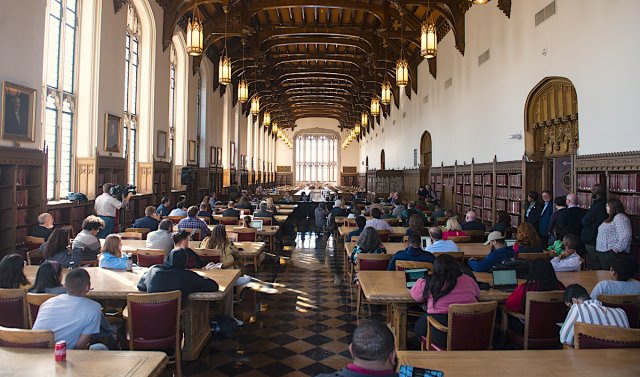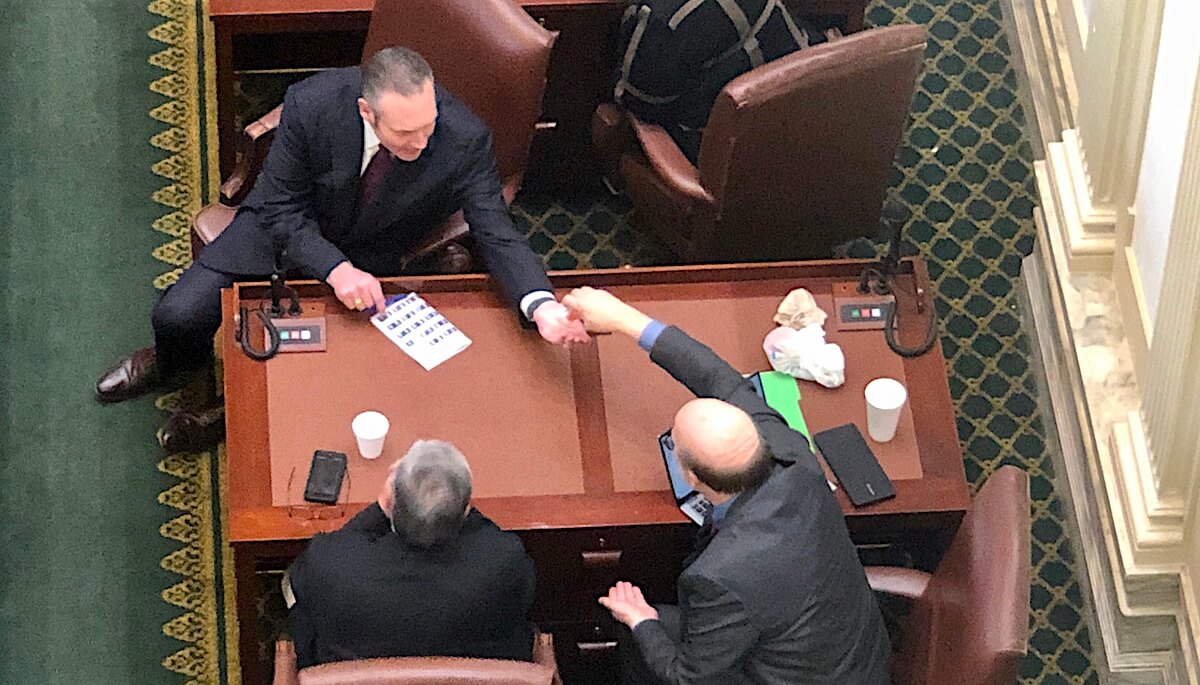

An effort temporarily expanding public bodies’ ability to teleconference and videoconference under the Oklahoma Open Meeting Act became a full-day affair at the state Legislature.
While lawmakers ultimately struck an agreement on the “extraordinary” COVID-19-containment measure, an initial bill advanced by the Senate after one question and no substantive debate around 9:30 a.m. stalled when it reached the other side of the Capitol. House members, media and watchdog groups raised concerns over scope, time period and transparency requirements.
Around 3 p.m., the House discussed and advanced its own version — amended into SB 661 — back to the Senate with a shorter authorization term, a recording requirement and a stated guarantee that the intent was to mandate display of meeting notices either in person or online.
By then, however, the Legislature’s upper chamber had been shut down owing to confirmation that a Senate staff member had tested positive for COVID-19. Senators and staff members were told to stay in their offices, and health care professionals began an investigation that included testing of those who might have been in close contact with the individual in question.
That person’s name has not been disclosed.
Value of recordings discussed by lawmakers

As the Senate ground to a halt Tuesday afternoon, the House negotiated with the Senate and governor’s office to adjust the proposed Open Meeting Act changes. When SB 661 emerged in its new version, it was amended three times, which established flexibility in the “recording” requirement of teleconferenced meetings and established a different termination date for the new rules: Nov. 15 or the end of Oklahoma’s statewide emergency designation, whichever comes first.
“The purpose is not to allow members to subvert the intent of the Open Meetings Act,” Rep. Chad Caldwell (R-Enid) said during questions on the bill. “What we are trying to do is anticipate at least the potential coming up of where having large gatherings of people for these meetings is problematic.”
One concern over the bill (embedded below) stemmed from its change to the public “display” requirements for meeting notices, which must be filed with county clerks and submitted to the Oklahoma Secretary of State’s Office.
Asked by Rep. Jason Dunnington (D-OKC) whether the amended Open Meeting Act will still require “display” of meeting notices either at a public body’s headquarters or on its official website, Caldwell said it would.
“Since we are allowing the whole meeting to go online, the requirement to post a physical notice on the building has been eliminated,” Caldwell said. “There would still be noticed required, but it just would not have to be physically posted. It would be online notice, and things like that.”
House Majority Floor Leader Jon Echols (R-OKC) presented the bill’s amendments and described “good-faith negotiations” that shortened the end date from the Senate’s proposal of March 2021.
“Their fear and why they wanted it for 12 months was to avoid any possibility of a special session,” Echols said. “Many in our caucus and many in your caucus had real concerns with 12 months because we thought it was too long of a period.”
Following several questions, the House advanced its version of the Open Meeting Act bill 69-2. About two and a half hours later, the Senate returned from its COVID-19 screening and took up SB 661. After a half-dozen questions, it passed 40-0.
“Let me just start by saying how proud I am to be a member of this body and the work we were able to do for this, not just overnight last night and this morning, but also as we worked on it today and had discussions,” Sen. Brent Howard (R-Altus) said during the bill’s presentation early Tuesday evening. “Regardless of our political affiliation, regardless of if we are rural or urban, we have worked together to help preserve public safety and the functions of the government.”
Asked about the video and teleconferencing recording requirement added by the House, Howard told his colleagues the House’s goal was to ensure citizens have “a little bit more availability of recording” of actions taken by public bodies.
“I do think this is a little superfluous,” Howard said. “[It creates] a little bit more burden, but it is needed to address the situation we are in.”
Sen. Julia Kirt (D-OKC) asked Howard questions and debate in favor of the measure.
“We do not take this lightly, and I don’t think anyone here is taking this lightly. This is an extraordinary measure,” Kirt said. “We are putting our trust in our agencies, boards and commissions.”
Between the House and Senate’s consideration of SB 661, Oklahoma Gov. Kevin Stitt held a press conference updating the public on COVID-19. He answered questions about changing the Open Meeting Act.
“The purpose is just so we can continue to function,” Stitt said. “I don’t think we’re waiving any of the public notice. We can record those meetings, invite the press to those meetings. So we’re not trying to not make all those meetings public and the discussion public. The deal is just to make sure people have access to continue to conduct business remotely without having to get into big groups, so that will be our recommendation as long as the CDC is saying keep gatherings under 10 (people).”
Stitt signed SB 661 on the morning of Wednesday, March 18.
SB 661 Open Meeting Act adjustments
